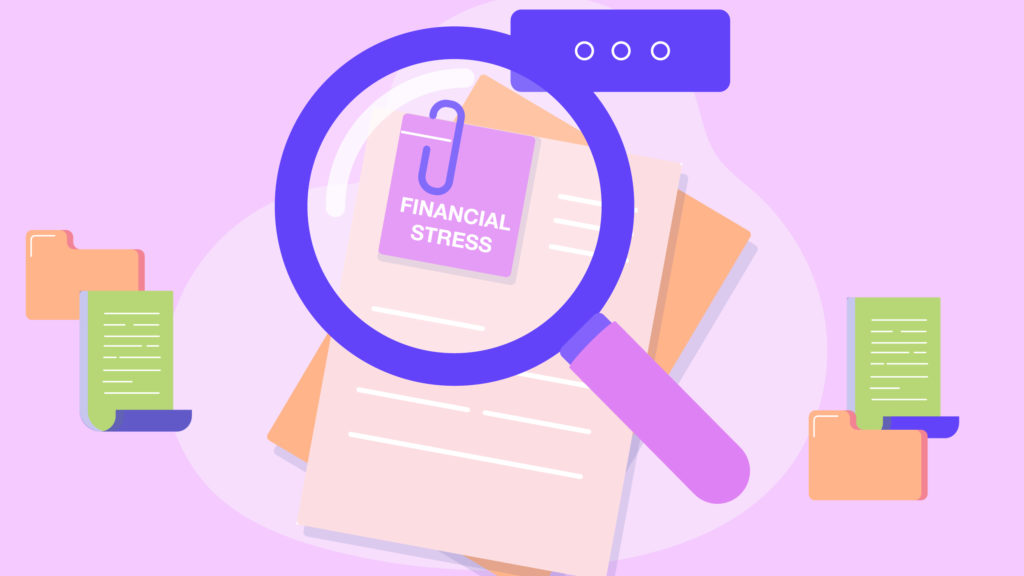[email-subscribers-form id=”2″]
A detailed look at Financial Stress
In the first part of our financial stress webinar series, Dr Nicola Gates provides a detailed look at financial stress.
Where psychology and finance meet
The name Financial Mindfulness indicates personal finances and attempts to secure peace of mind.
Descriptions, discussion and of course treatment of stress are the realms of psychology and not for financial experts to delve into.
So how and where is there any link between neuro-psychology and finance?
“Principally because financial stress is a leading cause of stress and distress,” said Dr Nicola Gates, a clinical neuropsychologist associated with Financial Mindfulness.
Relationships Australia also recognises that financial stress is a lead cause of relationship breakdown. Financial stress is a profound issue for health and mental health practitioners.
Dr Gates points out that the meeting of the two fields, which were for a long time thought to be unrelated, happens when there is a focus on prevention.
In this case, prevention of financial stress.
The role of finances in good health
A very short answer is that financial stress involves our thoughts about money and finances and what we do in terms of spending and saving, and how we manage our finances.
But it’s worth a more detailed examination of what underpins financial stress.
Fundamentally it is related to health and has an impact on our health.
Most of us think that being healthy is the absence of illness.
“I’ve talked to thousands, probably tens of thousands of people in my capacity as a health educator, and most people consider that they are healthy or enjoying wellbeing when they are not sick,” Dr Gates said.
But in fact, good health, as defined by the World Health Organisation since the 1950s, includes much more.
The WHO’s constitution states: “Health is a state of complete physical, mental and social well-being and not merely the absence of disease or infirmity.”
In the same document, it states that humans have a right to enjoy the highest attainable standard of health… without distinction of race, religion, political belief, economic or social condition.’
Integral are physical and mental health, and also as is occupation and ‘role functioning’.
This includes social and family relationships, and our environment, in the context of having meaning and purpose.
Impacts of financial insecurity
Financial security is also a key part of health and wellbeing.
Most people, on reflection, understand that financial security actually can underpin all the other factors that make up good health.
“If you haven’t got financial security, you actually can’t meet your health requirements,” Dr Gates says.
She points to the example of receiving a cancer diagnosis. According to the Dolomites Institute having cancer can lead to between $20,000-$50,000 in out-of-pocket expenses.
Poor role functioning can also affect financial security and vice versa.
“If you don’t have financial security, perhaps you can’t travel across the city to get a job or set yourself up in a business or something,” she says.
“Our research also shows that poor financial security and financial stress lead to a lot of aggression in people’s interpersonal relationships, and we know it has a significant impact on relationships.”
Also, without financial security, a person cannot influence and beneficially control their environment and their meaning and purpose.
“Financial security enables people, affords them often the time,” Dr Gates says.
“If you’re working three jobs or four jobs, you don’t have the time to pursue things that give you meaning and purpose.”
Lack of financial security also impacts relationships makes people feel isolated; they can’t meet psychological needs, including basic esteem.
Where someone is below the poverty line, this kind of extreme financial distress has major physiological impacts – sleep is affected, the immune system is threatened and sickness increases and even personal safety is reduced.
So financial security impacts people through every level of basic needs that are described in the famous pyramid of Maslow’s Hierarchy of Needs.
“You can imagine how financially secure will impact every level through the pyramid, from the basics,” Dr Gates says.
“But it also enables people to meet psychological their needs and a sense of belonging and connection.”
She says financial security is a fundamental aspect of health and wellbeing, and some people say it’s a fundamental right.
“This is the driver of my interest in addressing financial stress,” Dr Gates says.
What makes up financial stress
Financial stress has been defined before, and work done in Canada has been impressive, but the definitions have evolved.
“We described it as subjective, complex and multi-dimensional,” Dr Gates says.
It is personal because research shows that people can have high, secure financial status in terms of having financial assets and property and still, experience financial stress.
For example, they may have exposed themselves to high risks, where they haven’t got a return that causes them to stress for their future financial security. They may be asset rich but not be able to meet their daily needs. People that you would assume don’t experience financial stress do actually experience it.
It’s complex too because personal finance is incredibly complex. People can have Visa cards, multiple investment options, Afterpay, mortgage repayments, current accounts, savings accounts – and many other products besides.
It’s also true that financial literacy and skills – and even the law – have not kept up with the financially complex environment we find ourselves in.
“That is a significant cause of stress,” Dr Gates says.
How is financial stress multi-dimensional?
Because we have an individual, bio, psychosocial response to current and future financial concerns.
Financial stress triggers a physiological or bio-physiological response in our bodies and it triggers a psychological, emotional response in our brain, Dr Gates says.
Few would disagree financial stress also impacts our social relationships and it has implications for our behaviour.
It also pertains to the current and the future. You can be meeting all your basic requirements and maybe even saving, but not making enough for a housing deposit or to build superannuation.
“Financial stress is the opposite of financial security,” Dr Gates says.
The bio-psychosocial response in being financially stressed
Financial stress involves a bio-psychosocial response, which means the brain, cognition and behaviour are engaged, or ‘BCB’.
Financial stress triggers the sympathetic nervous system.
“When it triggers the sympathetic nervous system response, our body changes, which creates a burden on our body. And it also impacts the brain, cognition, neurotransmitters and so forth,” Dr Gates says.
Think about when you get a bill in the mail – plenty of people avoid opening it.
“That’s because their financial stress response has already been triggered,” Dr Gates says.
They might think ‘I know I can’t pay this’ and even have thoughts that increase that stress by thinking: ‘I can’t pay it, what am I going to do?’
A cycle of negativity increases the body’s stress response.
Or you can have a thought that goes, ‘okay, I can look at the bill, I’m going to phone the bank, I’m going to change my interest repayments’.
Thoughts can escalate the financial stress response – or de-escalate it.
Our behaviour can be unhelpful or helpful, which means sensibly – we can make favourable decisions. Or when we are financially stressed anxiety and stress can lead to unhelpful decisions and behaviour – such as managing it by spending.
A helpful behaviour would be changing our spending, putting our hand up and saying, ‘Hey, I need some help with this’.
The brain, cognition and behaviour relationship – the BCB – can be used to interrupt the negative financial stress response.
Recognising financial stress and its causes
Financial stress is the cause of stress – the stress response in the body is the same as all stresses.
The brain responds, the body response is precisely the same, Dr Gates says.
It might manifest in emotional, psychological symptoms like feelings of anxiety, worry, or concern. It may manifest itself in cognitive impacts – distractibility, poor attention, memory lapses, poor concentration.
Financial stress impacts the workforce and people’s ability to function in their daily life.
“We also know it affects people’s behaviour,” Dr Gates says.
People might gamble, drink more, eat more, spend more shopping and behave in their interpersonal relationships in a way that is unhelpful.
There can also be an escalation of verbal and control behaviour and physical violence in the home.
Financial stress is a significant problem.
“We know that it impacts over two million Australians at any one point in time, and it creates a substantial burden on people from a body, brain, mind perspective. And also, their families and their capacity to function,” Dr Gates says.
What are the causes of financial stress?
There are many and they change over a lifespan. In our 20s it might be paying for university, the prospect of a HECS debt. Saving money for a car, holidays while renting.
Then it might be mortgage repayment, starting a family and professional expenses.
Then things like insurance, superannuation and more money for the children. Research in Australia shows that raising a child costs about a quarter of a million dollars.
You may have to up-size your home, then medical expenses might start to come in.
“The concept of financial security changes across the lifespan,” Dr Gates says.
On a continuum, there is a temporal component with financial stress versus financial security.
“We can be struggling with issues, we can be surviving and managing, or we can be thriving.
When we’re struggling financially, and under financial stress, we know the impact – it reduces our immunity, increases sick leave, and increases sickness.
Our capacity for health-enhancing behaviours, like exercise, diet, and downtime, is affected.
The benefits of reducing financial stress
Dr Gates says people who are struggling with financial stress and people who are in survival mode too, can be helped by an improvement in their financial stress levels – towards a self-acknowledged ‘thriving’ state.
“We know that when people are thriving financially and in terms of health, we know that they enjoy higher immunity; they’re better able to make helpful, good decisions,” she says.
Sleep improves, and proactive health behaviours follow – such as having a fitness program and a good diet.
Financial security – with the skills and experience and ability to manage personal finances – enables people and allows them to ‘positive cycle’ out of surviving and towards thriving.










